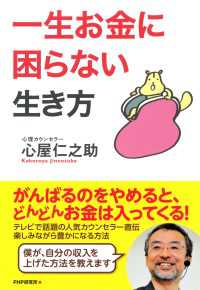- ホーム
- > 洋書
- > ドイツ書
- > Humanities, Arts & Music
- > Psychology
- > practical psychology
Full Description
Do we know what we do when we advise? - This is the fearful, irritating and subversive question that supervisors and coaches tend to ask themselves secretly and sometimes only admit to each other. It reflects the opposite side in the consulting offers, which are otherwise characterized by competence staging and which they normally address to customers and clients. However, it is a deeply consultative, and therefore self-explanatory question, because the practical work of consultants, which generally sees itself as reflexive, contains a wealth of the unconscious, the unknown, the unidentifiable or difficult to name, or the unrecognized. This clearly focuses on doing itself and not the effects of advice, because thinking in processes differs radically from thinking about achieving or even forcing effects. The contributions in this volume attempt to formulate questions theoretically: about the types of knowledge / non- Knowledge in consulting practice, according to the limitations and limitations of autonomy and rationality in consulting, according to the limits of understanding between consultants and clients / clients, and what we know (can) about reflexivity at all. The unsaid, only suspected or hidden, which is what makes counseling successful and sometimes blocks it, must of course not only be named theoretically, but also reconstructed empirically, for example via video interaction analyzes or self-confrontation interviews.






